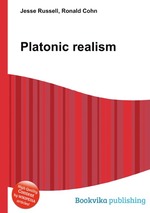Platonic realism
Jesse Russell Ronald Cohn
бумажная книга
High Quality Content by WIKIPEDIA articles! Platonic realism is a philosophical term usually used to refer to the idea of realism regarding the existence of universals or abstract objects after the Greek philosopher Plato (c. 427–c. 347 BC), a student of Socrates. As universals were considered by Plato to be ideal forms, this stance is confusingly also called Platonic idealism. This should not be confused with Idealism, as presented by philosophers such as George Berkeley: as Platonic abstractions are not spatial, temporal, or mental they are not compatible with the later Idealism`s emphasis on mental existence. Plato`s Forms include numbers and geometrical figures, making them a theory of mathematical realism; they also include the Form of the Good, making them in addition a theory of ethical realism.


